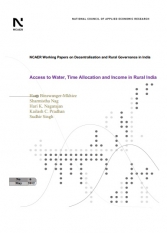Access to Water, Time Allocation and Income in Rural India
Kailash Chander Pradhan
Hari K. Nagarajan
Sudhir Kumar Singh
Hans P. Binswanger-Mkhize
Sharmistha Nag
May 2012
In this paper we show that investments to improve the supply and management of water reduce the time spent in fetching water by both men and women, which in turn will lead to a reallocation of the time saved to productive activities, and result in increased incomes. Using the national ARIS/REDS panel data of the NCAER we show that political reservations in the local government for vulnerable groups like scheduled castes and tribes, and women lead to greater local government investments in water supply and improved management. Political reservations are shown to increase the time spent by women in all productive activities, especially in self-employment in farm and non-farm activities. Increases in self-employment are shown to have the greatest impact among the productive activities on household incomes. We show that reservations also increase the wages that women receive in the rural non-farm labor market, which suggests that they reduce discrimination against women in labor markets
Agriculture and Rural Development







